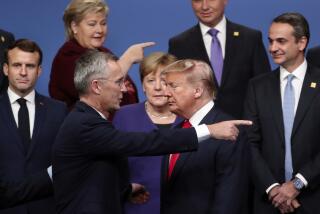World Political Lines Largely Unchanged
- Share via
PARIS — PARIS -- The immediate international responses to Secretary of State Colin L. Powell’s presentation of the U.S. case against Iraq on Wednesday were mostly political -- and predictable.
Pro-U.S. leaders in Eastern Europe and Britain said Powell’s evidence was so strong that it could have convicted Iraqi President Saddam Hussein in a court of law. Critics, whether antiwar or anti-American, dismissed the speech as a propaganda offensive.
And those in the middle engaged in adroit spin: Although Powell asserted that Iraqi intransigence renders U.N. arms inspections all but pointless, diplomats and politicians in France and Russia said he had presented the reasons inspections should be beefed up, not halted.
Overall, leaders and analysts were clearly impressed by the points Powell scored with his collage of intercepted phone conversations, satellite photos and reports from spies on the ground. But as the secretary himself had predicted, there was no single piece of evidence so powerful that it could win instant converts, they said.
“The war faction will say this has proved Saddam Hussein is not complying,” said Charles Heyman, a military affairs expert at Jane’s World Armies in Britain. “The antiwar faction can say the transcripts could have been edited and he hasn’t really made the link with Al Qaeda.
“I am quite willing to be convinced, but I’m still looking for the proof -- I don’t think he will convince any of the doubters.”
One thing is clear: Powell remains the ideal spokesman for the Bush administration. Europeans heap abuse on President Bush and Defense Secretary Donald H. Rumsfeld, calling them reckless warmongers. Yet they admire and respect Powell as a diplomat who understands their cultures and a former soldier who knows and hopes to avoid the horrors of war.
“Powell is the man to do the convincing,” said Guillaume Parmentier, director of a center for U.S. studies at the French Institute of International Relations here. Powell offered strong evidence that Iraq continues to develop clandestine biological, chemical and missile programs in defiance of the United Nations, Parmentier said.
“He was convincing in bits,” Parmentier said. “But I think he may have tried to prove too much. He was utterly unconvincing on the link with Al Qaeda: half a dozen men in Baghdad. The British intelligence service doesn’t even believe that.”
As had France’s foreign minister in a short speech at the United Nations, leaders of the French center-left opposition said Wednesday night that the presentation reinforced the reasons for pursuing U.N. inspections, not a quick war.
“There was no irrefutable proof,” said Jean-Marc Ayrault, president of the Socialist legislative group in the National Assembly. “There is only one thing that this information, if it is true information, leads me to conclude: The U.N. inspection team must continue its mission. If the Americans want to wage war at all costs, and that appears to be the case, they must be resisted.”
But the U.S. has resolute allies in Eastern Europe, such as Polish Prime Minister Leszek Miller, who was in Washington meeting with Bush at the time of Powell’s presentation.
“It seems that Colin Powell presented evidence not leaving much doubt,” Miller told Polish TV afterward. He said Powell proved “that Saddam Hussein is hiding a lot from the U.N. inspectors, that he is cheating, that he has at his disposal weapons of mass destruction and, most important, that he does not want to implement the U.N. Security Council resolution.”
In Japan, meanwhile, which in recent weeks has been edging closer to the Bush administration’s hard-line stance toward Iraq, Prime Minister Junichiro Koizumi told parliament that he found the speech convincing.
“I thought the suspicion that Iraq possesses weapons of mass destruction became significantly greater,” he told lawmakers. “There’s a mutual recognition in the international arena that Iraq has violated the rules.”
And in stalwart ally Britain, Magnus Ranstorp, a Middle East and terrorism expert at the University of St. Andrews in Scotland, said the presentation “summarized clearly the evidence of Iraq’s infrastructure of deception in terms of weapons of mass destruction.”
“I think this is a case for war -- either we maintain the status quo, or we don’t.”
*
Times staff writers Mark Magnier in Tokyo and Janet Stobart in London and Ela Kasprzycka in the Warsaw Bureau contributed to this report.
More to Read
Sign up for Essential California
The most important California stories and recommendations in your inbox every morning.
You may occasionally receive promotional content from the Los Angeles Times.













